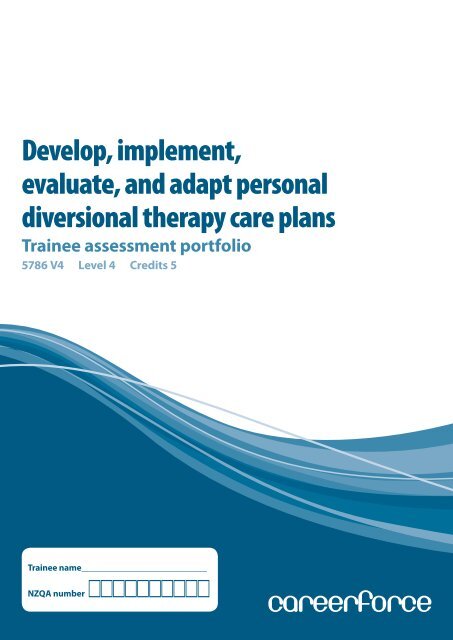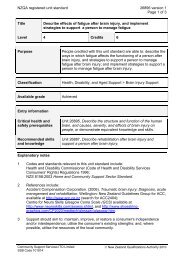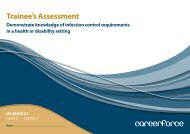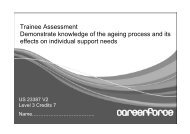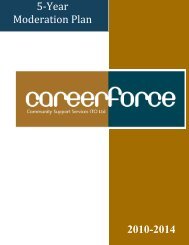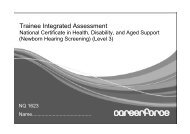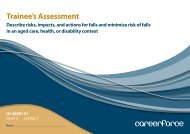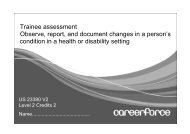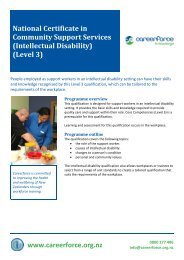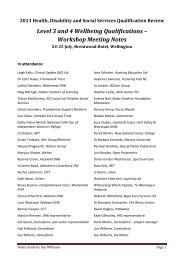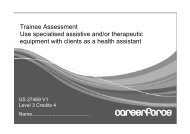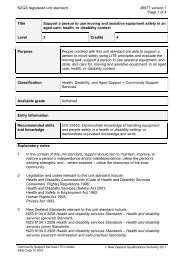Develop, implement, evaluate, and adapt personal ... - Careerforce
Develop, implement, evaluate, and adapt personal ... - Careerforce
Develop, implement, evaluate, and adapt personal ... - Careerforce
Create successful ePaper yourself
Turn your PDF publications into a flip-book with our unique Google optimized e-Paper software.
References• The organisation’s policies <strong>and</strong> procedures.• ”Portfolio <strong>and</strong> Case Study <strong>Develop</strong>ment” document(found at the end of this assessment portfolio).The trainee assessment portfolio contains• Instructions.• Important information.• Feedback form.• Assessment record sheet.• “Portfolio <strong>and</strong> Case Study <strong>Develop</strong>ment” document.Instructions• To complete this assessment you will needto develop a portfolio of documents whichdemonstrates that you have met all of therequirements of the unit st<strong>and</strong>ard. Please readthe “Portfolio <strong>and</strong> Case Study <strong>Develop</strong>ment”document which is found at the end of theassessment portfolio, before you start theassessment for this unit st<strong>and</strong>ard.• This portfolio will include:• Actual (original) documentation; <strong>and</strong>/or• A case study based on a real situation that youhave written for this assessment. Your portfoliowill need to be supported by additional oral orwritten commentary that you provide to yourassessor to demonstrate your competencein areas which are not covered by the actual(original) documentation or case study.• Where you use copies of original documents youwill need to ensure that all identifying details of theconsumer are removed. Removal of identifyingdetails may not be needed if you gain consentfrom the consumer to use the documentation thatyou have developed. In this case, written evidenceof consent should be included.• Your assessor will discuss with you the “professionalassessment” process involved in achieving theexpected outcomes from this assessment.• Attach all written material to the traineeassessment portfolio.• Your performance of the activities needsto be completed in a professional mannerwhich shows the assessor that you have afull underst<strong>and</strong>ing of all that is involved. Theassessor may require you to perform the taskson more than one occasion to ensure that youcan demonstrate consistency of performance.• All of your responses must be in accordance withyour organisation’s policies <strong>and</strong> procedures. Youneed to ensure that a copy of the appropriatesection(s) of your organisation’s policies <strong>and</strong>procedures is/are available as evidence to assistthe assessor.• Please give your trainee assessment portfolioto your assessor so feedback <strong>and</strong> comments canbe provided.• On successful completion, the results will beprocessed <strong>and</strong> sent to <strong>Careerforce</strong> for registeringcredits on the National Qualifications Framework.• Should you require assistance with any aspect ofthe assessment, please contact your assessor.Overview of assessmentActivity Description Unit St<strong>and</strong>ardElement 1Assessing the diversional therapy needs of a person, <strong>and</strong>Assessment TaskElement 2developing, <strong>implement</strong>ing, evaluating <strong>and</strong> <strong>adapt</strong>ing twoTask One (Blue)Element 3<strong>personal</strong> diversional therapy care plans.Element 45786 V4 <strong>Develop</strong>... <strong>personal</strong> diversional therapy care plans© <strong>Careerforce</strong> – Issue 1.0 – March 2010Trainee assessment portfolio3
1. Diversional Therapy Plan for an Everyday ActivityAll of the items included in the following checklist must be completed to achieve the expected outcomes forthe person.Assessing the diversional therapy needs of a personThe assessment of the diversional therapy needs of the person was carried out:• In consultation with the person.•• In accordance with the person’s choices <strong>and</strong> abilities.•• In accordance with your organisation’s policies <strong>and</strong> procedures. (1.1)•Assessment was carried out in a manner that maximised the independence of the person, wasappropriate to the person’s needs, utilised existing strengths, <strong>and</strong> wherever possible optimisedthe use of the local community. (Special note 1)•Comment (if required):5786 V4 <strong>Develop</strong>... <strong>personal</strong> diversional therapy care plans© <strong>Careerforce</strong> – Issue 1.0 – March 2010Trainee assessment portfolio5
Implementing the <strong>personal</strong> diversional therapy plan for an everyday activityUndertake the planned diversional therapy activities using the <strong>personal</strong> diversional therapy careplan you have developed. Evidence for undertaking these activities could include photographs, alog book or a written summary of the activities, feedback analysis etc.Remember that evidence of consent is required from the person/participants if photographs areincluded as part of the assessment.The diversional therapy activities undertaken must reflect the person’s choices <strong>and</strong> abilities, the<strong>personal</strong> diversional therapy care plans, <strong>and</strong> your organisation’s policies <strong>and</strong> procedures. (3.1, 3.2)••Comment (if required):5786 V4 <strong>Develop</strong>... <strong>personal</strong> diversional therapy care plans© <strong>Careerforce</strong> – Issue 1.0 – March 2010Trainee assessment portfolio7
Evaluating <strong>and</strong> <strong>adapt</strong>ing – where required – the <strong>personal</strong> diversional therapy plans for an everyday activityCarry out an evaluation of the <strong>personal</strong> diversional therapy care plan. (4.1)•Check that the plan is:• Fit for purpose.•• Individualised to the person.•• Applicable to the activities undertaken.•The evaluation of the <strong>personal</strong> diversional therapy care planmay include consideration of the following elements:• Resources• Contingencies• Purpose• Safety• Accessibility• Facilities• Staffing• Costings• Appeal <strong>and</strong>/orattraction• Benefits• Capacity• Risk management plan• Environment• OtherInclude any <strong>adapt</strong>ations you made (if any) to the <strong>personal</strong> diversional therapy care plan as aresult of your evaluation. (4.1, 4.2)•Comment (if required):Assessor confirmation:Assessor’s nameSignatureAssessor’s numberDate8 Trainee assessment portfolio © <strong>Careerforce</strong> – Issue 1.0 – March 2010 5786 V4 <strong>Develop</strong>... <strong>personal</strong> diversional therapy care plans
2. Diversional Therapy Plan for a Special OccasionAll of the items listed in the following checklist must be included to achieve the expected outcomes forthe person.Assessing the diversional therapy needs of a personThe assessment of the diversional therapy needs of the person was carried out:• In consultation with the person.•• In accordance with the person’s choices <strong>and</strong> abilities.•• In accordance with your organisation’s policies <strong>and</strong> procedures. (1.1)•Assessment was carried out in a manner that maximised the independence of the person, wasappropriate to the person’s needs, utilised existing strengths, <strong>and</strong> wherever possible optimisedthe use of the local community. (Special note 1)•Comment (if required):5786 V4 <strong>Develop</strong>... <strong>personal</strong> diversional therapy care plans© <strong>Careerforce</strong> – Issue 1.0 – March 2010Trainee assessment portfolio9
<strong>Develop</strong>ing the <strong>personal</strong> diversional therapy plan for a special occasion(Aspects of the plan that could be included are group size, resources, contingencies, purpose, safety,accessibility, facilities, staffing, costings, appeal <strong>and</strong>/or attraction, benefits, capacity, risk management plan,environment, other).The plan must identify <strong>and</strong> record goals that reflect the person’s choices <strong>and</strong> abilities. (2.1)•These goals must also take into account your organisation’s policies <strong>and</strong> procedures relative tohealth <strong>and</strong> safety <strong>and</strong> risk management. (2.1)•Comment (if required):<strong>Develop</strong> a <strong>personal</strong> diversional therapy care plan (for the person who you have previouslyassessed) that reflects:• The person’s choices <strong>and</strong> abilities.(2.2)•• The person’s service delivery plan. (2.2)•• Your organisation’s policies <strong>and</strong> procedures (2.3)•<strong>and</strong> which:• Includes a risk management plan (2.4); <strong>and</strong>•• Identifies health <strong>and</strong> safety issues as they apply to the person <strong>and</strong> allothers involved in the activity. (2.4)•Comment (if required):10 Trainee assessment portfolio © <strong>Careerforce</strong> – Issue 1.0 – March 2010 5786 V4 <strong>Develop</strong>... <strong>personal</strong> diversional therapy care plans
Implementing the <strong>personal</strong> diversional therapy plan for a special occasionUndertake the planned diversional therapy activities using the <strong>personal</strong> diversional therapy careplan you have developed. Evidence for undertaking these activities could include photographs, alog book or a written summary of the activities, feedback analysis etc.Remember that evidence of consent is required from the person/participants if photographs areincluded as part of the assessment.The diversional therapy activities undertaken must reflect the person’s choices <strong>and</strong> abilities, the<strong>personal</strong> diversional therapy care plans, <strong>and</strong> your organisation’s policies <strong>and</strong> procedures. (3.1, 3.2)••Comment (if required):5786 V4 <strong>Develop</strong>... <strong>personal</strong> diversional therapy care plans© <strong>Careerforce</strong> – Issue 1.0 – March 2010Trainee assessment portfolio11
Evaluating <strong>and</strong> <strong>adapt</strong>ing – where required – the <strong>personal</strong> diversional therapy plans for a special occasionCarry out an evaluation of the <strong>personal</strong> diversional therapy care plan. (4.1)•Check that the plan is:• Fit for purpose.•• Individualised to the person.•• Applicable to the activities undertaken.•The evaluation of the <strong>personal</strong> diversional therapy care planmay include consideration of the following elements:• Resources• Contingencies• Purpose• Safety• Accessibility• Facilities• Staffing• Costings• Appeal <strong>and</strong>/orattraction• Benefits• Capacity• Risk management plan• Environment• OtherInclude any <strong>adapt</strong>ations you made (if any) to the <strong>personal</strong> diversional therapy care plan as aresult of your evaluation. (4.1, 4.2)•Comment (if required):Assessor confirmation:Assessor’s nameSignatureAssessor’s numberDate12 Trainee assessment portfolio © <strong>Careerforce</strong> – Issue 1.0 – March 2010 5786 V4 <strong>Develop</strong>... <strong>personal</strong> diversional therapy care plans
5786 V4 <strong>Develop</strong>... <strong>personal</strong> diversional therapy care plans© <strong>Careerforce</strong> – Issue 1.0 – March 2010Trainee assessment portfolio 13
Portfolio <strong>and</strong> Case Study <strong>Develop</strong>mentWhat is a Portfolio?A portfolio is a collection of your working papers that must be assembled to meet the requirements of aparticular assessment. A portfolio will include copies of all documents that you have used or written whensupporting a person (or people) in a health, disability or community setting. When reviewing your portfolio,an assessor will expect to see clear evidence that the documentation you have provided meets the requiredoutcomes of the assessment task.When planning a portfolio, you must obtain the consent of all parties involved. Even when consent has beengranted, you may still need to remove key identifying details of the person or people you are supporting.The documentation you provide in a portfolio will vary, depending on the requirements of the particularassessment task. But all portfolios are likely to include:• Signed consent forms from the people with whom you have worked, that allow you to include documentssuch as the copy of a care plan or a person’s social history.• Copies of all notes you develop as you work with people in a supported setting e.g. photocopies of yourfield/case notes, observations, memos, reflective journal etc.• Copies of all forms you may have used or created to carry out your role e.g. an incident reporting form, anactivities register, a checklist for fieldtrips/outings etc.• Copies of all documents that your organisation requires you to comply with or complete as part of yourwork e.g. copies of specific policies <strong>and</strong> procedures, a service delivery plan, an inventory of equipment, arisk management strategy etc.It is generally acceptable to include documentation that has been developed within the last twelve months ofyour practice with the person or people you are supporting.14 Trainee assessment portfolio © <strong>Careerforce</strong> – Issue 1.0 – March 2010 5786 V4 <strong>Develop</strong>... <strong>personal</strong> diversional therapy care plans
Portfolio <strong>and</strong> Case Study <strong>Develop</strong>mentWhat is a Case Study?A case study is a presentation that describes your experiences with a particular person(s) or situation.This presentation may be fictionalised to the extent that identifying details are removed; but a case studyshould be based on an experience that actually happened in connection with a person(s) you were supporting,or with a particular situation that you were involved in. When reviewing your case study, an assessor willexpect to see clear evidence that the documentation you have provided meets the required outcomes of theassessment task.A case study can be used to provide evidence about a person or situation that:• You have worked with or in as part of your support role.• Links theory to practice.• Leads you to reflect on the situation <strong>and</strong> on the steps you took.• Can be verified as having actually taken place.A case study can be presented in one of three ways (or a combination of these ways):1 A collection of copies of documents which have been completed based on details, plans <strong>and</strong> evaluationsassociated with a person(s) or situation, with all identifying detail removed. Together, these documentsshould provide details of the person(s) or situation that you were involved in; what happened <strong>and</strong> why; what theoutcomes were; <strong>and</strong> what you learnt from the experience.2 A written (essay) format that contains the same information specified in italics in 1 above.3 A st<strong>and</strong>alone oral <strong>and</strong>/or PowerPoint presentation that contains the same information specified in italicsin 1 above.It is generally acceptable to include documentation that has been developed within the last twelve months ofyour experience of the person or people you are supporting or the situation(s) that is/are the subject of yourcase study.It is important that your manager, supervisor or team leader confirms that the case study you have developedreflects an actual situation in which you were involved.5786 V4 <strong>Develop</strong>... <strong>personal</strong> diversional therapy care plans© <strong>Careerforce</strong> – Issue 1.0 – March 2010Trainee assessment portfolio15
16 Trainee assessment portfolio © <strong>Careerforce</strong> – Issue 1.0 – March 2010 5786 V4 <strong>Develop</strong>... <strong>personal</strong> diversional therapy care plans
5786 V4 – <strong>Develop</strong>, <strong>implement</strong>, <strong>evaluate</strong>, <strong>and</strong><strong>adapt</strong> <strong>personal</strong> diversional therapy care plansLevel 4 Credits 5Assessment record sheetTrainee informationNameEmployerNZQA/NSI number (ROL)Date of birthTrainee statement of authenticityI hereby state that the evidence submitted for assessment is my own work.SignatureDateTrainee performance summary (completed by assessor)Assessment tasks No credit CreditTask OneReassessmentComments/feedback to traineeAssessment result (completed by assessor)I have assessed the trainee <strong>and</strong> confirm:The requirements have been met to demonstrate competency in 5786 V4.Further evidence is required to demonstrate competency.NameSignedAssessor numberDateOn completion of the unit st<strong>and</strong>ard one copy of this assessment record sheet must be given to the trainee forhis/her records <strong>and</strong> another copy sent to <strong>Careerforce</strong> so the credit can be registered on the NQF.5786 V4 <strong>Develop</strong>... <strong>personal</strong> diversional therapy care plans© <strong>Careerforce</strong> – Issue 1.0 – March 2010Trainee assessment portfolio 17
Quality Assurance Manager<strong>Careerforce</strong> LtdPO Box 25 255Christchurch 814418 Trainee assessment portfolio © <strong>Careerforce</strong> – Issue 1.0 – March 2010 5786 V4 <strong>Develop</strong>... <strong>personal</strong> diversional therapy care plans
5786 V4 – <strong>Develop</strong>, <strong>implement</strong>, <strong>evaluate</strong>, <strong>and</strong><strong>adapt</strong> <strong>personal</strong> diversional therapy care plansFeedback formPlease help us to improve our trainee assessment portfolio.<strong>Careerforce</strong> is always keen to review its materials to improve the quality of the learning experience.You can help us by telling us what you think of this assessment portfolio <strong>and</strong> by offering suggestionson ways it can be improved.When you have answered the questions, please send this page to:Quality Assurance Manager<strong>Careerforce</strong> Ltd.www.cssito.org.nzPO Box 25 255ChristchurchFax (03) 371 9285What I liked most about the portfolio <strong>and</strong> why?What I liked least about the portfolio <strong>and</strong> why?Please give your rating of the following topics by ticking the relevant yes, no, or maybe boxes.Topics or aspects of the content of this document Yes Maybe NoAssessment record sheet is useful.Assessment questions are easy to underst<strong>and</strong>.The assessment portfolio is well laid out <strong>and</strong> easy to follow.Additional commentsContact details (optional)NameTelephoneOrganisationE-mail5786 V4 <strong>Develop</strong>... <strong>personal</strong> diversional therapy care plans© <strong>Careerforce</strong> – Issue 1.0 – March 2010Trainee assessment portfolio 19
Quality Assurance Manager<strong>Careerforce</strong> LtdPO Box 25 255Christchurch 814420 Trainee assessment portfolio © <strong>Careerforce</strong> – Issue 1.0 – March 2010 5786 V4 <strong>Develop</strong>... <strong>personal</strong> diversional therapy care plans


